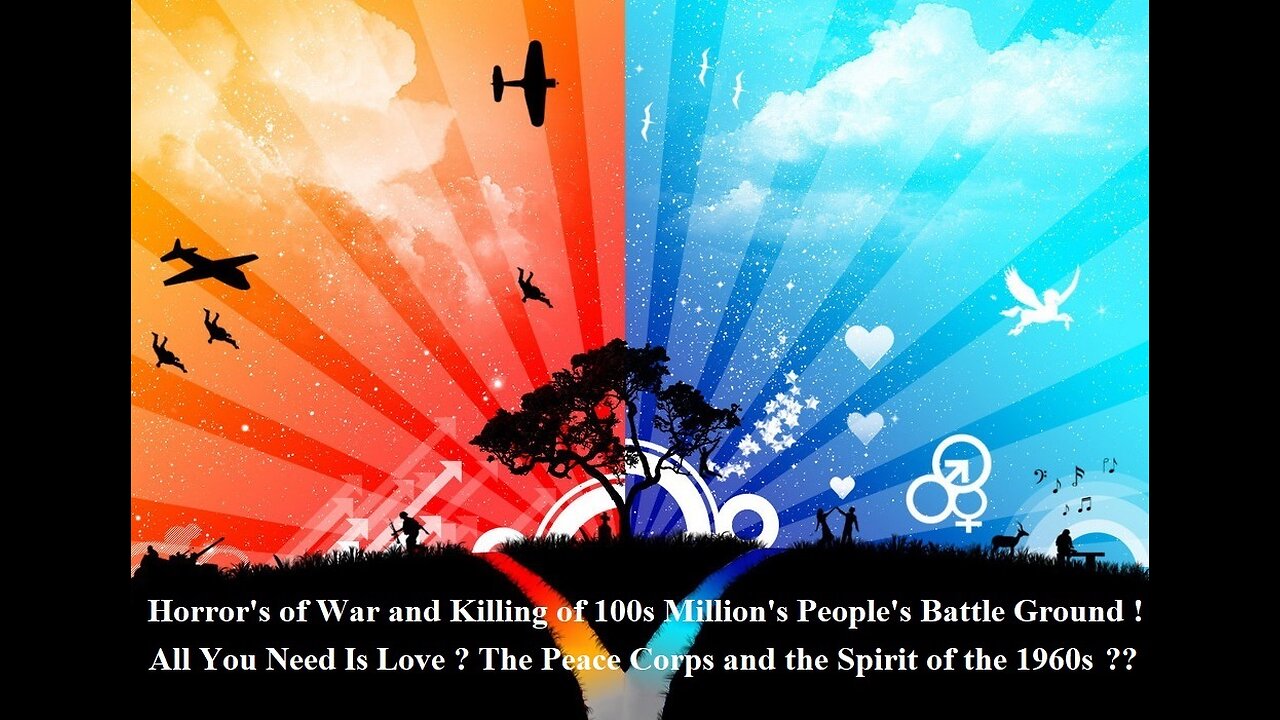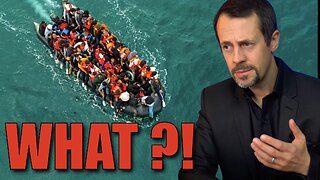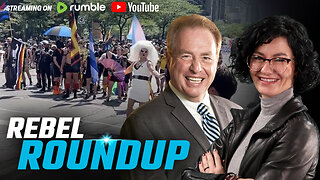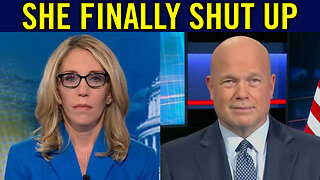Premium Only Content

Vietnam Requiem and Horror's of War and Killing of 100s Million's Battle Ground ?
If you remember any war's at all you'll know it contains nuggets of information about the Vietnam War, a conflict that the new world order also fought in. Well, those snippets come from this ABC news documentary that Paul was watching and he thought it would be a good idea to take clips from this documentary and about a conflict in which million's men were still fighting 8-10 years after coming home. Some thought war was anti-American but how could that be when vietnam vets were thanking him? I think we know the answer to that one. Anyway, this is the documentary in its entirety and it took me ages to put together. It's fair use because I don't intend making any money out of it. Besides, I don't know how to stop the war's. There is rarely a single, clear cut cause for the outbreak of war. people have fought and continue to fight for a number of many reasons. Sadly, the effects of such conflicts are both loss of life and humanitarian crisis. of course the extent of these effects depend the duration of the conflict, the types of people and place targeted and the kinds of weapons that were used.
Hollywood Propaganda and Glorification of War and killing for Peace by the Film.
Everywhere people looked there was propaganda. “There were posters on every lamp post that read things such as “help the troops, buy war bonds”. In this article, what glorifies war was the propaganda that was portrayed through Hollywood movies. The movies consisted of “propaganda themes” that aimed at influencing the American people. War has been present since the beginning of human history. Likewise, war movies have been present since the movie industry began. Just like most other genres of film, war films have been created as a form of entertainment to profit a person or organization. More people are willing to spend their money and time on a feeling of action, excitement, heroism, and patriotism than gruesome and horrid images of real and common human destruction. Propaganda has been used by governments for a very long time and when motion pictures came into existence, governments almost immediately saw the new medium as an opportunity to influence the public. Governments such as the United States of America, cooperate with the movie industry. Our society praises and respects these kinds of heroic actions. It is rare to find a movie in which a soldier attempts to rescue a fallen comrade and not only fails but loses his life in the process. Another heroic and courageous act is neutralizing a very large threat. This act occurs in Saving Private Ryan when a small squad of soldiers uses teamwork and ingenuity to disable a tank and a group of enemy soldiers accompanying it. This type of scenario can be found in many movies starring American soldiers. Movies tend to portray American soldiers victoriously overcoming their enemies because of their superior training, ability to think on their feet, improvise, and weaponry. It gives the message to the audience that American soldiers are better than any other country’s soldiers and that it is much more common for an American soldier to live through war. America has never admitted to losing a war and the news media usually mentions the deaths of American soldiers only when it seems that the soldiers were defenseless, such as when they are killed by car bombs or hidden improvised explosive devices, more commonly known as IEDs. This causes the perception that America can afford to go to war because American casualties always remain relatively low and America always wins. This perception coupled with America’s value of heroism and courage causes people to join the military in order to be ? Kill and be killed ?
As Hollywood begins to navigate the #MeToo landscape,” Tatiana Siegel reported, “one of the first casualties appears to be big-screen erotica. In the wake of the Harvey Weinstein scandal, studios are steering clear of sex.” Alyssa Rosenberg, writing in the Washington Post, hopes that Hollywood’s embarrassed executives are navigating “the end of a very narrow way of thinking about what’s alluring.” Instead of movies that objectify women, she suggests more films that portray sex and sexuality in intelligent ways.
This reckoning is long overdue. And it can be extended to another genre that has distorted how men behave: war movies. Hollywood has shown itself capable of making excellent war movies (think “Three Kings,” “Paths of Glory,” and “The Best Years of Our Lives”), but most are problematic. Some of the biggest war movies of the post-9/11 era don’t just show violence in ways that are often gratuitous and occasionally racist. They model a cliched form of masculinity that veers from simplistic to monstrous.
For instance, you can see Rambo and John Wayne return to life in the latest war blockbuster, “12 Strong,” which was produced by Jerry Bruckheimer, who also brought us “Black Hawk Down.” “12 Strong” is an extravaganza about a Special Forces team that fought the Taliban in Afghanistan in the weeks and months after 9/11. During the movie’s pivotal scene, the leader of the Green Berets, played by Chris Hemsworth (the grievously handsome star of the Thor franchise), decimates a hive of Taliban fighters with his rifle ablaze as he gallops ahead on his fearless horse (yes, he’s riding a horse). In the same way that Hemsworth’s assault weapon goes rat-tat-tat and the bad guys fall like bulleted dominoes, the scene itself checks off one born-in-Hollywood cliché after another: of the rugged gunslinger, the warrior in camo, good versus evil, the modern vanquishing the profane, a man at his fullest.
Whenever I write about the real-world impact of war movies – and I’ve gone to bat against “American Sniper,” “Zero Dark Thirty” and “13 Hours” — I always get responses along the lines of “Relax, these are just movies. Don’t take them so seriously. They’re harmless.” That’s when it becomes necessary to say that movies can create or reinforce narratives of history and gender that influence what people think and what they do. Boys and men develop their notions of masculinity from a variety of sources that include the films they watch (the extent to which this is true is, of course, open to debate). The time has come for Hollywood to turn away from war movies that, while satisfying to both a studio’s bottom line and a flag-waving concept of patriotism, perpetuate a model of masculinity that does violence to us all.
Don’t get me wrong, soldiers often do brave things and shouldn’t be denied credit for it. I’ve reported on the wars in Afghanistan, Iraq, Somalia, and Bosnia, so I’ve seen heroism from soldiers of many nationalities, as well as cowardice and abuse. That’s not the issue. What matters is that well into the second decade of our forever war, the combat movies that populate our multiplexes and our minds are devoted to a martial narrative of men-as-terminators that should have been strangled at its birth a long time ago.
While “12 Strong” is marketed as a true story based on a nonfiction book by Doug Stanton, there is nothing in Stanton’s book that resembles the climactic scene of Hemsworth bravely shooting his way on horseback through a gauntlet of waiting-for-paradise Talibs. There is one passage in the book in which the Special Forces soldier played by Hemsworth rides his horse into the corpse-strewn aftermath of a battle, but the fighting and dying are over by then. When I asked the film’s public relations team about this difference, they sent me the following statement from Stanton: “This scene is an amalgamation of the horse charges that the [Afghan] Northern Alliance made against the Taliban, and which the [American] horse soldiers themselves observed and assisted in. But as it appears in the movie, the same scene does not appear in my book.”
Inventions are what Hollywood does best, of course, but it’s hard to know whether to chuckle or cry about the grafting of this magical practice onto a film that purports to show the heroism of U.S. soldiers; their actual bravery was not good enough for a film-whisperer like Bruckheimer, apparently. They called in airstrikes against Taliban positions while riding horses through frigid mountain passes, getting sniped at by the enemy and taking shelter in ancient caves with guerrilla fighters subsisting on nuts and stale bread? How can I make a movie about that, get me someone from rewrite! So in the rewrite, the riding-and-shooting-into-a-hail-of-bullets courage of Afghan fighters is transposed onto American soldiers (hence the promotional still from “12 Strong” that is published with this story). It’s a sort of cinematic stolen valor.
It doesn’t have to be this way. The best war film of the last year, “Thank You for Your Service,” based on the nonfiction book by David Finkel, quietly focuses on the troubles of a group of soldiers after they come home from a deployment in Iraq. The film has only two battle scenes, and both are excruciating to watch because their violence is frightening rather than glorious – the opposite of Bruckheimer’s feel-good shoot-’em-ups. The men in “Thank You for Your Service” are struggling with PTSD, painfully coming to the awareness that the combat that gave them such purpose in Iraq has injured their psyches. Nobody looks like Thor in this movie, nobody behaves like Thor, and the John Wayne style of masculinity that these men might have aspired to emulate is shown to be an artificial and harmful construct.
You know what’s coming next.
“12 Strong” earned nearly twice as much in three days as “Thank You for Your Service” has earned in three months. And the numbers – more than $15 million in ticket sales for “12 Strong” in its first week – are Venmo pennies compared to the box office take of “American Sniper,” the macho movie about Navy SEAL sniper Chris Kyle that has earned more than half a billion dollars since 2014. Who is at fault for the lucrative war chum that Hollywood tosses into our Saturday nights – the movie studios or the movie-goers who love to consume this masculine nonsense?
I’ll gladly answer that question: both. But first let’s examine the greater power of producers, directors, and actors, because their choices are so influential. It’s not a matter of deciding to zone out for 90 minutes in front of a screen, but of investing large amounts of time and resources into making distorted movies about men at war (such movies are almost never about women). I realize it might be absurd to think that somehow these filmmakers (surprise — they’re mostly men) can be persuaded to reconsider before doing it again. The only thing that might be more ridiculous to imagine is the movie industry turning away from films that objectify women – which, according to The Hollywood Reporter, is apparently happening.
Nuclear war
Nuclear war is the most destructive form of conflict imaginable in human, economic and environmental terms. nuclear weapons are uniquely destructive. Not only by inflicting massive loss of life through the initial blast wave and by heating the seat of the fireball that accompanies it, nuclear weapons also produce lethal doses of radioactive fallout, the effects of which extend beyond the immediate theatre of war and long after the conflict has ended.
The possibility of using nuclear weapons in war is usually divided into two subgroups, each with different nuclear weapons and causing different effects.
The first, a limited nuclear war (sometimes attack or exchange), refers to a small scale use of nuclear weapons by one or more parties. A "limited nuclear war" would most likely consist of a limited exchange between two nuclear superpowers targeting each other's military facilities, either as an attempt to pre-emptively cripple the enemy's ability to attack as a defensive measure or as a prelude to an invasion by conventional forces as an offensive measure. It might also refer to a nuclear war between minor nuclear powers, who lack the ability to deliver a decisive strike. This term would apply to any limited use of nuclear weapons, which may involve either military or civilian targets.
The second, a full-scale nuclear war, consists of large numbers of weapons used in an attack aimed at an entire country, including both military and civilian targets. Such an attack would destroy an entire nation. Such a nuclear war would be unlikely to remain contained between only the two countries involved, especially if either of the nuclear superpowers were involved.
The Hollywood-style Independent feature film: "Nuclear War" is about a nuclear war with N. Korea and features a nuclear terrorist attack that destroys New York city and which raises the possibility the U.S. government knew in advance and allowed this catastrophe to occur as justification for war; and we have a Vice President who clamors for nuclear strikes, hackers who attempt to thwart nuclear war, and where a ground war breaks out in North and South Korea, and the United States "accidentally" attacks China with nuclear weapons, and and the result is a world wide Nuclear World War 3--the Earth is destroyed. Near the beginning of the film we are introduced to the Terrorist under interrogation, then teenagers Lisa (a good hearted aspiring ballerina) and Johnny (nice guy football jock, aspiring doctor); the loving happy family of Pete and Jane and their daughter and 4 month old puppy Tiger Wolf; FBI agent Frank Thompson as he walks through a park where we are also introduced to a distraught Carol, her little daughter, and later her husband who brings good news for a happy family reunion--people we might identify with and care about and whose lives are snuffed out along with 500,000 other souls by a nuclear blast in the heart of New York City, the nuclear devastation of which is presented in eye-popping special effects. At the heart of this film we meet Vice President Kane (who has the persona of Dick Cheney and Hannibal Lecter) and a female National Security Adviser Dr Rios with their agenda of war against all the oil producing nations of the Middle East, and 4 star General Samuel Gunn who is suspicious of their actions. After the nuclear destruction of New York City and its aftermath (featuring victims, etc.), the action shifts to China whose government (along with all the governments of the world) do not accept Washington's version of events, and who wish to prevent a world wide nuclear war; and we are introduced to four roller-skating computer-jocks (Gabe and Jessica (White) and Lao and Jade (Chinese)) who attend Beijing university; and Colonel Chang and Colonel Joe Beck (the fathers of Lao and Gabe) who are good friends and military attaches representing the militaries of their respective governments. With the slogan "Hackers of the World Unite", the four roller-skating computer-jocks hack into Vice President Kane's computer and email accounts and make a number of disturbing discoveries; they then unite the hackers of the world to hack into U.S. Defense System computers to prevent Nuclear World War Three (preventative actions other nations are also taking). Initially, they succeed, but then the U.S. overcomes these electronic roadblocks to war and the missiles are launched, one of which "accidentally" strikes Beijing--and a world wide nuclear war begins. This film "Nuclear War" ends as it begins, a journey through the universe and outer space, past star-studded galaxy after galaxy after galaxy... each spiraling galaxy home to billions of suns and solar systems just like our own--the existential point of which is: Our beautiful blue planet, our hatreds and self-destructive wars, even mutual annihilation, the extinction of the human race and obliteration of our planet, are completely meaningless, insignificant and means nothing in an eternal cosmos where our little world is but a mote of dust, a single grain of sand in the vastness of an infinite sea of time and space. We anticipate "Nuclear War" will be one of the most frightening, terrifying, and thought-provoking movies ever made, and a huge box office success. Almost a dozen movies with "end of the world" themes have grossed over 500 million dollars in movie ticket sales. For example, "Independence Day" (1996) grossed $811,200,000; the film "2012" (2009) grossed $766,812,167; "War of the Worlds" (2005) grossed $591,377,056; "Armageddon" (1998) grossed $554,600,000; "The Day After Tomorrow" (2004) grossed $527,939,919. The film, "Avatar" (2009) in which the people of another world were threatened with total destruction grossed nearly 3 Billion Dollars ($2,781,505,847). These sales figures do not include DVD and other royalty sources, and none of these films dealt with nuclear war. "Nuclear War" was written from a psychological and artistic perspective and to appeal to men and their "dates." We present characters viewers will care about and identify with, and who will make viewers feel badly when they die. The special effects, nuclear war and nuclear destruction, the underlying theme of 9-11, and the ending which is unlike anything that has ever been done before, will have audiences and reporters talking about this film for weeks after they have seen it. "Nuclear War" was written by Dr. R. Joseph who also co-wrote the highest grossing, longest running, one man play in the History of Broadway, and several "best selling" books and popular films. Dr. Joseph's films have been viewed by over 44 Million People, some of which have been described as the most frightening movies ever made. Hollywood films, with audiences of 42 million have grossed over $500 Million. Of the 42 million who have viewed Dr. Joseph's films, 85% are male between the ages of 18 and 45. Likewise, the majority of those who buy tickets to go to movies are males between the ages of 18 and 45, and Dr. Joseph's films also appeal to this same highly sought after target audience. Dr. Joseph knows how to make films that men want to watch. Dr. Joseph anticipates his Hollywood style production, "Nuclear War", will easily gross $400 Million Dollars world wide. The film will feature great Chinese and American actors, incredible special effects, and an ending unlike anything which has been seen before.
I loved war films. Casablanca, The Great Escape and Judgement at Nuremberg are still some of my favorite movies. I can still remember the thrill of watching Saving Private Ryan and Life is Beautiful when they aired on cable.
Even watching anti-war films like Jarhead filled me with an ambiguous patriotic feeling. War was hell — these movies made that clear — but it was portrayed as a necessary evil required to serve our country — whatever that meant.
As a kid, I never questioned that premise and always accepted it as true. I applied these beliefs to every war film I watched. Oliver Stone’s Platoon shows a young man (Charlie Sheen) whose idealism fades when he’s caught in the middle of infighting between two sergeants with conflicting opinions on the local Vietnamese people. Sam Mendes’ Jarhead shows a marine (Jake Gyllenhaal) struggling with his own false expectations of war, his dysfunctional unit, and his inability to maintain composure in the face of uncertainty. Neither paints a pretty picture of war — but somehow these films were just as appealing.
I joined the military because I didn’t know what I wanted to do in college. I thought the benefits would be good and the military would be a great career stepping stone. I came from a conservative military family and I felt this weird inner obligation to serve my country. Movies and shows like Black Hawk Down and Band of Brothers made me think serving in the military is what it truly means to love my country. Neither of these appear to glorify war; they treat it as a necessary horror Americans tolerate in order to conquer an evil dark side. Without these people, ‘evil’ would win. French director and film critic François Truffaut claimed “there’s no such thing as an anti-war film.” The reasoning is due to these movies’ appealing displays, the thrill of combat and the onscreen camaraderie. Even the war movies with plenty of tragedy and heartbreak still manage to make violence and killing seem cool. And they rarely portray their own country’s military actions in an accurate manner.
My personal experience is not far off from Truffaut’s claim. Though I was never deployed or experienced combat, in the army there was a lot of emphasis and appreciation toward belonging to a brotherhood. There was some sort of innate pride generated from wearing the uniform and being around those wearing the same. I felt a sense of belonging, though I couldn’t describe why. This sense of belonging made me ignore things around me I’d otherwise speak out against.
While I was in the army I heard the word savages a lot. I always thought it was being used interchangeably with terrorists. But slowly over time I started to notice officers and other soldiers using the word as an umbrella term for anybody and everything in the middle east.
They would deny any wrongdoing by the U.S military (partly because criticism while in uniform was forbidden), and claimed all actions were justified regardless of nuance or context. They would deny America’s foreign policy playing a large part in the attacks on 9/11. They would deny 7,500 civilian deaths from American-led airstrikes. I was fed the lie that everyone in the Middle East hates Americans because their cultural differences didn’t like that we were free. I was told our presence over there was to protect freedom, defend democracy and end terrorism. And I’m ashamed to say, I believed it.
I remember how my platoon sat in the classroom listening to a story from one of our drill sergeants about one of his deployments. He told us how in the gunner seat of his humvee he witnessed an “angry looking man” driving really fast directly at him. He told us how he fired a warning shot but the “angry haji didn’t stop.” And when the man got too close, he “painted the backseat red.” He concluded his story by telling us he soon found out the guy’s car had brake failure; he couldn’t stop.
A very ugly silence immediately filled the room, but the next moment he said, “But man, that .50 cal felt great.” This was met with laughter.
A few days later we were back in the classroom where a different drill sergeant complained about the new rules of engagement, and how during his first deployment, “it was on. It was Us vs. Them.” He talked about killing as if it was The Most Dangerous Game. He said they were training us to not ask questions, to “save who needed to be saved, and kill who needed to be killed.” The ambiguity of that statement seemed intentional.
No one ever elaborated on why we were in the Middle East. They never elaborated on whether the Iraq War was a legitimate war. They kept it as vague as possible and said it wasn’t our position to ask questions.
Drill sergeants would talk about how great young recruits fresh out of high school were, because our brains were easily molded to become the best soldier possible and they could change the way we think and act. I would often write home and mention how well I was doing and how great of a soldier I was becoming. After hearing remarks from the mouths of superiors such as “sending the towlies to meet their virgins and Allah,” I found myself looking around at my platoon and noticing all of us silently nodding in approval.
That same day I was halfway through writing a letter before I stopped and reread what I was writing. I wrote that I couldn’t wait to protect my country from savage terrorists. I threw the letter away.
Many years later I was at an NHL game and the arena had a small ceremony for active duty military members due to retire. The place was roaring with cheers and applause but I stood still with my arms at my sides. How could I know these military members weren’t the types to call everyone in the Middle East savages? How could I know they weren’t the type who denied or tried to justify the lies about WMDs, the CIA’s use of torture, or the U.S’s many coups for personal gain throughout the world? How could I know if they were a good person?
The NHL isn’t the worst offender — that accolade belongs to the NFL. Between 2012 and 2015 the NFL was paid $53 million dollars of taxpayer money to advertise the military for recruitment. This is known as paid patriotism. During the Star-Spangled Banner players were required to line up and face the flag with their hand over their hearts. David Meggyesy disobeyed this order, which resulted in his benching at the end of the 1968 season, and after the 1969 season he was out of the league despite playing at an all-pro level.
The NFL made Arizona Cardinal’s safety Pat Tillman the poster boy for recruitment after he left his NFL career to join the Army in the aftermath of the September 11th attacks. While deployed in Iraq, Tillman became very vocal about his disdain for the Bush Administration and claimed what the United States was doing was “fucking illegal.” After Tillman was killed by friendly fire, the United States Army covered it up because they couldn’t let their poster boy for recruitment become the new face of anti-war advocacy.
The military has even started attempting to recruit people off Twitch.tv, a streaming platform mostly used by young people. A report in The Nation detailed the attempts, which included giveaways of computer hardware and asking people as young as twelve to sign recruitment forms. One political activist was banned from the official U.S Army Esports channel for asking what the streamer’s favorite U.S “w4r cr1me” was, then proceeding to link to a Wikipedia list of U.S war crimes. (The words ‘war crime’ were prohibited by the channel’s moderation settings and the channel has since been taken down after criticisms of censorship and first amendment violations.)
Representative Alexandria Ocasio-Cortez introduced an amendment to vote to prohibit the military from recruiting off the platform, but the amendment was rejected. Rep. Peter Visclosky didn’t vote in favor, claiming because of the low qualification percentage of young Americans, “We ought to cast a very broad net to encourage young Americans to serve in their country.”
This isn’t the military’s first attempt at trying to hide or shift blame for war crimes. Sledgehammer Games collaborated with the Pentagon for their recently released game Call of Duty: Modern Warfare (2019). The game has a mission in the fictionalized Middle Eastern country of Urkistan. During the mission the player is told there is only one road if there’s an attempt to escape to the mountains — Tariq Almawt, or ‘The Highway of Death’ . The game tells us that the Russians bombed it during the invasion.
The Highway of Death actually happened — except it was bombed by the United States, not the Russians. This six-lane highway — officially known as Highway 80 — was subject to bombings that caused hundreds of deaths to fleeing Iraqi forces, civilian refugees and Kuwaiti hostages that were complying with the UN Resolution 660.
Despite knowing all these war crimes, attempted cover-ups and shifting of blame, I felt guilty — guilty that I was failing my country, my family and my friends — values that were given to me from a young age without elaboration that I just blindly contributed to military service. I felt stupid because I let movies, television and entertainment shape my expectations of what the military would be like.
Likely because pentagon liaison officers oversee many scripts asking for use of military equipment.
This very thing happened in Top Gun. During its theatrical run, the U.S Navy set up recruitment tables outside theaters. Overall confidence in the military increased and the Navy saw an uptick in military enlistments.
Russell Coons, director of the Navy Office of Information West, claimed his office turns down ninety-five percent of scripts that come in. Coons claimed, “because in most cases it doesn’t represent our core values …, we’re not going to support a program that disgraces a uniform or presents us in a compromising way.”
While movies do have artistic freedom, which allows certain movies to exist without blatantly glorifying the military, Hollywood has been a propaganda arm for the film industry for some time and it can shape how audiences perceive such topics. It certainly shaped mine.
This is most noticeable in movies like John Wayne’s The Green Berets. Wayne wrote president Lyndon B. Johnson, asking for use of props and on site filming locations under the condition that the Pentagon got final say of what they could portray. The film also attributed war atrocities such as rapings and kidnappings to the Vietnamese, even though those specific atrocities were committed by U.S troops.
In Clint Eastwood’s American Sniper, legendary sniper Chris Kyle is portrayed as a good ol’ Christian southern boy who joined the military after 9/11 and saved many American soldiers’ lives due to his precision aim. In Kyle’s book, which the movie is very loosely based on, Kyle claims he found killing fun and referred to Iraqis as ‘savages.’
American Sniper’s biggest sin isn’t it’s willful disregard for accuracy, but rather how it quantifies patriotism. Throughout the film the audience is constantly reminded of the exact number of confirmed kills Kyle has — 160. The film never questions the act of killing, but rather celebrates it. Friends, family and fellow soldiers are constantly applauding Kyle for his confirmed kills against the ‘savages’ and ‘animals’ — as the movie calls the people of Iraq. Kyle is never complimented for being a good soldier or a good person. He’s never complimented on his ability to ‘defend democracy.’ The only thing people in the movie care about is that number — 160. The movie wants us to celebrate Kyle’s proficiency in killing ‘savages’ and ‘animals’ without reason and without reflection of what we have to show for it.
Even when films question the act of killing, soldiers are always painted as the victims. Sure, they’re victims by virtue of being a tiny cog in the military industrial complex machine, but when films reflect and introspect about war it always stops at the individual. Looking at Platoon again, Sheen’s character never reflects broadly. In a scene where he’s told to dig trenches and fill sandbags, he has a monologue claiming “…hell is the impossibility of reason, that’s what this feels like — hell.” He continues on about how much he hates it and how he think he’s made a mistake. He never questions his place in that larger machine — the machine that lied to start a war.
“American foreign policy is horrendous ‘cause not only will America come to your country and kill all your people, but what’s worse I think, is that they’ll come back twenty years later and make a movie about how killing your people made their soldiers feel sad.” — Frankie Boyle
Zero Dark Thirty is the best example of blatant U.S military propaganda being perpetuated by Hollywood. Its script was heavily influenced by input from the CIA. The film shows a detainee that is continuously brutally tortured and it’s this detainee that finally gives up a name — a name that the entire movie hinges on to find information about Osama Bin Laden. In reality, our war crimes of torture didn’t cause useful intelligence to be obtained. The film attempts to justify these war crimes with audio tapes of 9/11 victims crying for help. It takes advantage of the audience’s 9/11 trauma to justify the war crimes its characters are committing.
The Report, meanwhile, is an anomaly among military-related films. It’s one of the rare movies to show the U.S in a negative light. It doesn't hold any punches and accurately represents torture’s ineffectiveness to obtain information. The film is about former senate investigator Daniel Jones of the Senate Intelligence Committee, who conducted the senate’s largest investigation in history and found that the CIA lied about the specific tactics being used, their effectiveness, severity and broke the law several times in an attempted cover-up. The Report even pokes fun at Zero Dark Thirty by having Daniel Jones (Adam Driver) scoff while watching it.
The scariest propaganda is the kind that goes mostly undetected by wide audiences. Plenty of other types of movies can be filled with propaganda. The director of entertainment media at the U.S department of defense worked with Michael Bay on his Transformers franchise. The two mutually agree to show off the military’s latest equipment. Peter Berg’s Battleship is about the U.S Navy dealing with an alien invasion. Producer Sarah Aubrey claimed “we made this movie because we wanted to showcase the modern Navy…” Battleship and the Transformers franchise are CGI heavy blockbusters aimed at kids to advertise toys — toys and something else.
I fell victim to Hollywood’s perpetuation of military propaganda and find a lot of others have as well. It wasn’t solely responsible for my enlistment, but it played a larger role than I’d like to admit. I find myself getting frustrated with many war movies now because I picture someone else falling into the same trap I did. I picture another person silently nodding in agreement to a hate filled speech about the Middle East. I picture another fresh high school graduate being lied to about America’s unlawful and immoral self-serving military actions. There’s someone else out there watching movies portraying the U.S military as the arbiters of freedom, justice and peace when history has shown otherwise. I picture someone else making the same mistake I did.
How do we fix this? Is there even a way to fix this? Do we extend the cultural shift of how we are planning to accurately portray police on screen to how we can portray the U.S military on screen? If so, what does the other side of this look like? Are audiences ready or interested in movies that portray the military as it really is? The nation was powerful and prosperous, the president was vigorous and young, and a confident generation was gathering its forces to test the New Frontier. The cold war was well under way, but if you could just, as the song went, “put a little love in your heart,” then “the world would be a better place.” The Peace Corps, conceived in the can-do spirit of the sixties, embodied America’s long pursuit of moral leadership on a global scale. Traversing four decades and three continents, this story of the Peace Corps and the people and politics behind it is a fascinating look at American idealism at work amid the hard political realities of the second half of the twentieth century. More than any other entity, the Peace Corps broached an age-old dilemma of U.S. foreign policy: how to reconcile the imperatives and temptations of power politics with the ideals of freedom and self-determination for all nations. All You Need Is Love follows the struggle to balance the tensions between these values from the Corps’ first heady days under Sargent Shriver and beyond to the questioning years of the Vietnam War, when the Peace Corps was accused of being window dressing for imperialism. It follows the Peace Corps through the years when volunteering dropped off―and finally into its renewed popularity amid the widespread conviction that the Peace Corps preserves the nation’s finest traditions. With vivid stories from returned volunteers of exotic places and daunting circumstances, this is an engrossing account of the successes and failures of this unique governmental organization, and of the geopolitics and personal convictions that underpin it. In the end, the question that is most compelling is whether the Peace Corps most helped the countries that received its volunteers, or whether its greater service was to America and its sense of national identity and mission.
-
 57:54
57:54
What If Everything You Were Taught Was A Lie?
18 days agoA Complete Guide To Expose Russia Gate Conspiracy Timeline Will Shock You Open Your Eyes Now
2.43K14 -
 9:43
9:43
ColdBeer
7 days ago10 Best RTS games like WARCRAFT 3
7 -
 15:07
15:07
True Crime | Unsolved Cases | Mysterious Stories
2 days agoChurch CCTV Caught the Suspect – 5 Mysterious Unsolved Cases (Part 5)
47 -
 1:05:51
1:05:51
Timcast
2 hours agoTrump Seizes Control of DC Police, Deploys National Guard As Crime Skyrockets
120K77 -
 2:09:22
2:09:22
Steven Crowder
4 hours ago🔴 BREAKING: Trump Declares Federal Control of DC
254K168 -

Neil McCoy-Ward
1 hour ago🔥 You Won’t Believe What The UK Government Just ADMITTED! 🇬🇧
5.61K2 -
 LIVE
LIVE
Rebel News
1 hour agoMontreal Pride drama, Jewish father attacked, Atlantic Canada climate lockdown grows | Rebel Roundup
821 watching -
 LIVE
LIVE
IrishBreakdown
2 hours agoNotre Dame Must Continue Its Dominance Over The ACC
314 watching -
 12:50
12:50
itsSeanDaniel
19 hours agoSmug CNN Host STUNNED by GENIUS Trump Aide
10.2K15 -
 1:01:37
1:01:37
Flyover Conservatives
12 hours agoTHE GREAT SILVER SETUP FOR SUCCESS. My prediction: It’s about to pop, and BIG! | FOC Show
17.9K1